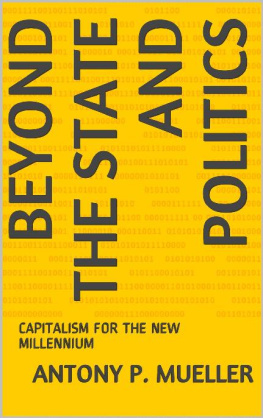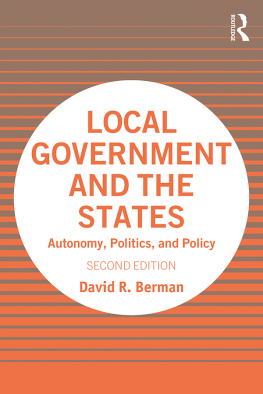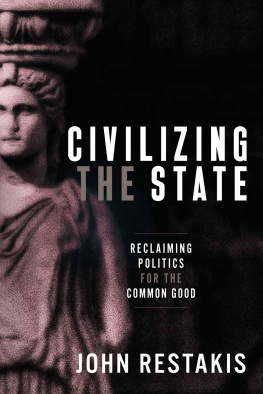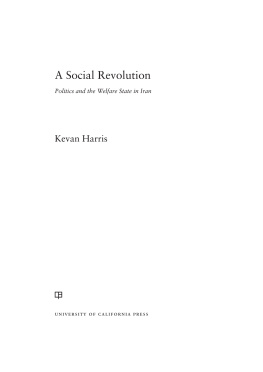BEYOND
THE STATE AND POLITICS
Capitalism for the new millennium
Antony P. Mueller
BEYOND THE STATE AND POLITICS. CAPITALISM FOR THE NEW MILLENNIUM
Copyright 2018 by Antony P. Mueller. All Rights Reserved.
ISBN: 1722955511
13:978-1722955519
All rights reserved. No part of this book may be reproduced in any form or by any electronic or mechanical means including information storage and retrieval systems, without permission in writing from the author. The only exception is by a reviewer and by academics, who may quote short excerpts in a review.
Printed in the United States of America
based on Beyond the State and Politics. Capitalism for the New Millennium
First Printing: April 2018
Amazon KDP
New edition July 2018
ISBN-9781980571445
CONTENTS
The Problem
Foreword
Introduction
Chapter I
Beyond the state and politics
Economy and society - State capitalism - Backgrounder: the origins of modern state capitalism Institutional change Democracy and capitalism Projects of transformation At the crossroads Outlook
Chapter II
Capitalism
Capitalism in perspective - Backgrounder: Capital - Development stages of capitalism - Capitalism and the state Backgrounder: Building blocks of modern capitalism - What are capitalists good for? The stock market without puzzles Backgrounder: US stock market - Commerce Monetary economy Equality is not justice Origins of Western capitalism Market process and competition Backgrounder: Utility, value, and price Prices and competition Mass production Freedom and capitalism Summary
Chapter III
Wealth creation
The meaning of economic growth Growth traps - Backgrounder: The rise and fall of parasitic economies - Economics of wealth creation - Backgrounder: time preference - Backgrounder: Interest, consumption, and savings - Value creation and capital structure - The state as an enemy of growth - Creative destruction - Obstacles to innovation - Free trade - Summary
Chapter IV
Socialism
A deadly utopia - Command economy - Backgrounder: Friedrich Hayek on central planning and totalitarianism - Economic calculation - Planned chaos - Marxist errors Backgrounder: Marx theory of the collapse of capitalism A dream becomes a nightmare Systemic Misery - Summary
Chapter V
Interventionism
Fascist roots of interventionism - Origins of modern state capitalism Rational irrationality - Legacy of interventionism - Backgrounder: Effects of price interventionism - Interventionism and the market process - Employment Power and economic law Welfare: more costs than benefits Healthcare costs Cost explosion in education - Social policy Backgrounder: origins of social policy - Missing standards The chimera of social justice Backgrounder: concepts of justice - Perpetual financial crisis Backgrounder: the economics of the public debt - Backgrounder: where does the money comes from? - Capital, savings, and entrepreneurship - Summary
Chapter VI
Economic stabilization
The myth of crisis capitalism Backgrounder: Stagflation - Backgrounder: Says Law - Monetary policy - How small crises become big crises A menu of models Backgrounder: Survey of business cycle models No crisis without a preceding boom - What happened in the Great Depression? - Lessons yet to learn - Backgrounder: Misery Index - Backgrounder: the economics of inflation and deflation The sorrows of central banking Inflation-targeting Bailouts and stimuli The pitfalls of policy-making The value of money - End the Fed The crisis of 2008 - Summary
Chapter VII
Anarcho-capitalism
The State and its minions - Voluntary servitude - The age of the individual - What is anarchism? - Concepts - Is Anarcho-capitalism possible? - The struggle for liberty - Death of the gatekeepers - Toward the new world of freedom- Sortition(demarchy) -Agenda -Outlook
Appendix
Anarcho-individualist order - basic concepts
Main types of government failures
Ten fundamental indictments against the State
Principles of economic governance
Principles of anarcho-capitalism
Principles of anarchist individualism
Bibliographical References
Annotated bibliography of anarcho-capitalism (by Hans-Hermann Hoppe)
About the author
BEYOND THE STATE AND POLITICS
LIST OF TABLES AND FIGURES
- BEYOND THE STATE
Principles of anarcho-capitalism
The position of libertarianism in the political spectrum
Main steps to an anarcho-capitalist order
- CAPITALISM
Stages of modern capitalism
Types of capitalism
Structural elements of capitalism
Main forces of economic progress
Barter
Monetary exchange
Foundational factors Preference ranking
Determinants of value
Chain of value determination
Chain of determinants of remuneration of modern capitalism
Market process
Cost spiral
Determinants of price
Competitive process
Features of modern capitalism
- WEALTH CREATION
Savings components
Poverty trap
Determinants of the market interest rate
Cycle of welfare spending and economic stagnation
Main barriers to innovation
Return Matrix of Venture Capital Projects
Dimensions of economic knowledge
Geographical market dimensions
Effects of free trade
- SOCIALISM
State Murders by Socialist Regimes 1917-1979
Democides by the Soviet regime
Organizational structure of the centrally planned economy
Command and information chain of a centrally planned economy
Arrow of production
Arrow of valuation
Design defects of socialism
- INTERVENTIONISM
Characteristics of market knowledge
Lags of policy measures
Types of government intervention
Classical unemployment model
Healthcare spending and life expectancy
Selected consumer goods and wages compared to general price level, 1997-2017
Selectivity of institution and income by study area
Government spending in percent of gross domestic product since 1880
Concepts of justice
Coefficients of public debt
Determinants of the debt coefficient
Central bank balance
Commercial bank balance sheet
Main monetary aggregates
- ECONOMIC STABILIZATION
U.S. economic growth since 1870
Deflationary and inflationary gap in Keynesian perspective
Stagflation
Structural deficiencies of the Keynesian economic model
Price-wage-price spiral
Keynesian, monetarist, and neoclassical sequences
Structural defects of monetarism
Velocity of central bank money, 1928-2016
Idealized public debt cycle
Ratchet effect of public deficits and debt
Typology of business cycle models
The Marxist model
Keynesianism
Post-Keynesianism
New Keynesians
Schumpeters business cycle model
Real Business Cycle Theory
Neo-classical crisis model
Monetarism
Austrian Business Cycle Theory
Capital-based business cycle
Bad policy cycles
New Deal Policies
International Financial Obligations after WWI
International Financial System under Dawes and Young Plan
Kindleberger spiral
Contraction of world trade, 1929-1933
The German economy - economic growth and inflation, 1926-1939
Dimension of the Great Depression
United States. Great Depression Data 1929-1940
Rothbards Dos and Donts in a depression
Components of the misery index
Purchasing Power of the U.S.-dollar, 1913-2017
Global money creation by central banks, 2008-2017
United States. Labor and capital productivity, 1899-1937
Main objectives of macroeconomic policy
Main instruments of macroeconomic policy
Next page










